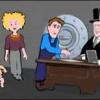| Online: | |
| Visits: | |
| Stories: |
Putting Lazy to Bed: Chronic fatigue syndrome is a physical disorder, not a psychological illness, panel says
Discussions concerning all matters of humanity’s ascension into a higher dimensional existence culminating in 2012

Excerpt from washingtonpost.com
Chronic fatigue syndrome is a “serious, debilitating” condition with a cluster of clear physical symptoms — not a psychological illness — a panel of experts reported Tuesday as it called for more research into a disease that may affect as many as 2.5 million Americans.
“We just needed to put to rest, once and for all, the idea that this is just psychosomatic or that people were making this up, or that they were just lazy,” said Ellen Wright Clayton, a professor of pediatrics and law at Vanderbilt University, who chaired the committee of the Institute of Medicine, the health arm of the National Academy of Sciences.
Although the cause of the disorder is still unknown, the panel established three critical symptoms for the condition (also known as myalgic encephalomyelitis):
- A sharp reduction in the ability to engage in pre-illness activity levels that lasts for more than six months and is accompanied by deep fatigue that only recently developed.
- Worsening of symptoms after any type of exertion, including “physical, cognitive or emotional stress.”
- Sleep that doesn’t refresh the sufferer.
In addition, the committee said, true chronic fatigue syndrome also includes either cognitive impairment or the inability to remain upright with symptoms that improve when the person with the condition lies down, known as “orthostatic intolerance.”
The panel acknowledged what people with chronic fatigue syndrome have long complained about: They struggle, sometimes for years, before finding a health-care provider who diagnoses a disorder that often devastates their lives. Sixty-seven percent to 77 percent reported in surveys that it took longer than a year to receive a diagnosis, and about 29 percent said it took longer than five years. The vast majority of people with the disorder remain undiagnosed, the panel said, estimating that between 836,000 and 2.5 million Americans have it.
“Seeking and receiving a diagnosis can be a frustrating process for several reasons, including skepticism of health care providers about the serious nature of [chronic fatigue syndrome] and the misconception that it is a psychogenic illness or even a figment of the patient’s imagination,” the panel wrote. Less than a third of medical schools include the condition in their curricula and only 40 percent of medical textbooks contain information on it, the experts said.
Christine Williams, who has the illness herself and is vice-chair of the board of directors for the advocacy group Solve ME/CFS Initiative, welcomed the IOM report.
“I have been sick for six-and-a-half-years, and this is definitely the most encouraging thing that I have seen,” she said. Williams praised the IOM for setting forth a set of clearly understandable diagnostic criteria, including the hallmark symptom “post-exertional malaise.”
Williams predicted that the IOM panel’s proposed new name for the illness — “systemic exertion intolerance disease”–would be widely debated by patients’ groups. But she added that the IOM “moved in the right direction by getting away from ‘chronic fatigue syndrome’,” which she said trivialized a serious disease.
Williams, who spent three decades working as a health policy expert in the federal government, said she hopes the report sparks additional research into new treatments for the illness.
The cause of chronic fatigue syndrome remains unknown, but symptoms may be triggered by an infection or “immunization, anesthetics, physical trauma, exposure to environmental pollutants, chemicals and heavy metals and, rarely, blood transfusions,” the panel reported. Clayton said mononucleosis is “a major trigger” of chronic fatigue syndrome among adolescents, but little is known about causes beyond that.
Treatments can include drugs such as anti-depressants and sleeping pills; gentle exercise and psychological counseling; and lifestyle changes such as limiting stress, caffeine, nicotine and alcohol.
Clayton also emphasized that many people with chronic fatigue syndrome also have other medical problems, which can complicate diagnosis and treatment.
“Lots of adults have more than one thing going on,” she said. “If they meet these criteria, they have this disorder. They can have something else as well, which is not uncommon in medicine.” http://ascensionearth2012.blogspot.com
Source: http://www.ascensionearth2012.org/2015/02/putting-lazy-to-bed-chronic-fatigue.html




